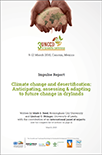The authors of a UN Convention to Combat Desertification (UNCCD) scientific assessment of the climate-land degradation nexus have published their findings in a book titled ‘Land Degradation, Desertification and Climate Change: Anticipating, Assessing and Adapting to Future Change.' The results will feed into the work of the UNCCD's Science-Policy Interface (SPI) and its first Global Land Outlook, due to be published in June 2017, as well as contributing to analyses by the Economics of Land Degradation (ELD) Initiative on the costs and benefits of action, or inaction, against land degradation.
 13 May 2016: The authors of a UN Convention to Combat Desertification (UNCCD) scientific assessment of the climate-land degradation nexus have published their findings in a book, titled ‘Land Degradation, Desertification and Climate Change: Anticipating, Assessing and Adapting to Future Change.’ The results will feed into the work of the UNCCD’s Science-Policy Interface (SPI) and the first Global Land Outlook, due to be published in June 2017, as well as contributing to analyses by the Economics of Land Degradation (ELD) Initiative on the costs and benefits of action, or inaction, against land degradation.
13 May 2016: The authors of a UN Convention to Combat Desertification (UNCCD) scientific assessment of the climate-land degradation nexus have published their findings in a book, titled ‘Land Degradation, Desertification and Climate Change: Anticipating, Assessing and Adapting to Future Change.’ The results will feed into the work of the UNCCD’s Science-Policy Interface (SPI) and the first Global Land Outlook, due to be published in June 2017, as well as contributing to analyses by the Economics of Land Degradation (ELD) Initiative on the costs and benefits of action, or inaction, against land degradation.
Co-published by Routledge and the UNCCD, the book is based on an Impulse Report, titled ‘Climate change and desertification: Anticipating, assessing and adapting to future change in drylands,’ which the co-authors, Mark Reed and Lindsay Stringer, prepared for the UNCCD 3rd Scientific Conference in March 2015. The report highlights how communities’ vulnerability to climate change and desertification is tied to their sensitivity to and ease of adapting to these changes, and discusses both positive and negative “feedback loops” between climate change and land degradation. The authors identify several “win-wins” as well as a smaller number of “triple-wins” that not only address climate change and land degradation, but also biodiversity and the enhancement of ecosystem services, notably through efforts to scale up ecosystem-based adaptation and sustainable land management.
The book calls for greater cooperation among researchers, local communities and international policy-makers in order to deliver timely and cost-effective solutions to ensure that the interactions and feedback between climate change and land degradation do not further magnify risks to people and ecosystems across the world. [UNCCD Press Release] [Climate change and desertification: Anticipating, assessing & adapting to future change in drylands] [IISD RS Story on Outcome of UNCCD 3rd Scientific Conference]